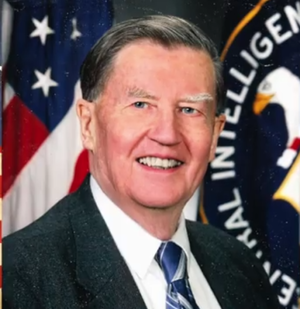Hugh Montgomery (spook)
( spook, polyglot) | ||||||||||||||||
|---|---|---|---|---|---|---|---|---|---|---|---|---|---|---|---|---|
 | ||||||||||||||||
| Born | November 29, 1923 Springfield, Massachusetts | |||||||||||||||
| Died | April 6, 2017 | |||||||||||||||
| Nationality | US | |||||||||||||||
| Alma mater | Harvard University | |||||||||||||||
| Member of | Office of Strategic Services | |||||||||||||||
63 years with the Central Intelligence Agency, where he was one of the agency's greatest linguists.
| ||||||||||||||||
Not to be confused with Bilderberger H. Montgomery Hyde.
Hugh Montgomery was a United States diplomat and intelligence officer.[1] He worked for 63 years with the Central Intelligence Agency until March 2014, and has been called one of the CIA's founding fathers. [2][3]
Early Life
Hugh Montgomery was born in Springfield, Massachusetts on November 29, 1923. He was educated at Harvard University, receiving a B.A. in 1947, an M.A. in 1948, and a Ph.D. in 1952.
Montgomery was wounded while a paratrooper in World War II and joined the Office of Strategic Services's counterintelligence branch, known as X-2. Sometimes behind enemy lines, he at the end searched for German atomic scientists, took over a German intelligence station in the Carinthian Alps and liberated the concentration camp Buchenwald.
Central Intelligence Agency
Montgomery joined the Central Intelligence Agency, the successor to the OSS, in 1952 and worked in many CIA positions over a career that spanned six decades.[4]
He speaks eight languages fluently, including German and French and can communicate in another half dozen.
During the Cold War, Montgomery worked in Athens, Rome (10 years), Paris and Vienna. He was one of the first officers in occupied post war Berlin. After the war, he returned to Harvard under the GI Bill, where he took a Ph.D in Romance languages (French, Italian etc). He taught at Harvard until he was persuaded by Richard Helms to join the CIA in 1952.[5]
During a CIA assignment in Berlin, he helped tap Soviet communications lines running under the city (an operation that later turned out to have been compromised). In Moscow, he ran one of the most famous and productive CIA assets in history, the Soviet officer Oleg Penkovsky.[6]
Montgomery temporarily left the CIA in 1981 when President of the United States Ronald Reagan nominated him as Director of the Bureau of Intelligence and Research in the United States Department of State, an office he held from October 19, 1981 until January 6, 1985. From 1985–1989 he was a deputy U.S. ambassador to the United Nations. He returned to the CIA after this assignment and worked with the Agency until he retired in 2014.
Retirement
Montgomery received the William J. Donovan Award from the OSS Society for his service to his country in 2015.[7]
Montgomery received an honorary doctorate from the Institute of World Politics in Washington, DC in 2010.
References
- ↑ https://ia803408.us.archive.org/0/items/pdfy-9MwmH_nnJ4eOmL66/Philip%20Agee%20%26%20Louis%20Wolf%20-%20Dirty%20Work%20%281978%29.pdf
- ↑ [1] Lamothe, Dan, Spy party: Tuxedos, martinis and some of the greatest heroes of World War II, Washington Post, November 9, 2015
- ↑ http://www.presidency.ucsb.edu/ws/?pid=38868
- ↑ [2] Lamothe, Dan, Spy party: Tuxedos, martinis and some of the greatest heroes of World War II, Washington Post, November 9, 2015
- ↑ https://youtu.be/WD5s_ghbOaM
- ↑ [3] Harris, Shane, Inside the Party for America’s Finest Spies, Daily Beast, November 9, 2015
- ↑ [4] Lamothe, Dan, Spy party: Tuxedos, martinis and some of the greatest heroes of World War II, Washington Post, November 9, 2015
Wikipedia is not affiliated with Wikispooks. Original page source here

